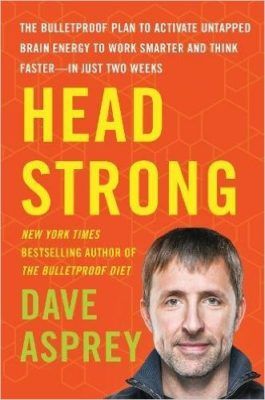4 Easy Ways to Combat Brain Fog That Bulletproof’s Dave Asprey Swears By

For all the buzz around inflammation, most of the time, it's associated with gut or skin probs. But it turns out brain fog—that annoying feeling of not being able to concentrate, or blanking out on random little things, like your old boss' name—can actually be a symptom that something's up with your gray matter.
"If you have inflammation of the skin, gut, or in another way, you also have inflammation of the brain," says biohacking expert and Bulletproof founder Dave Asprey.
The Silicon Valley entrepreneur has made a career out of helping people clear their minds—and up their productivity in the process—with his (butter-spiked) coffee, drinks, supplements line, and now his new book, Head Strong, which is full of ways to work smarter.
As he puts it, brain fog is basically a breakdown of your mitochondria, AKA your cell's energy production centers. So making sure they have what they need is key when you're trying to focus on a project. "When you take away mitochondria function, you have less energy in your brain," he says.
Keep reading for 4 ways to lift your brain fog straight from Head Strong.

1. Keep your plate colorful
No surprise here: Food that's bad for your body is bad for your brain—and Asprey says the biggest culprits are sugar and fried food. "Even things fried in a 'good oil,' like olive oil...cause inflammation of the arteries [that] interrupts blood flow to the brain," he says.
And almost everyone has felt firsthand the brain-drain effects sugar can cause (after you come down from the high). "Every time your blood sugar crashes, you can expect to have some mitochondria disfunction," Asprey says. "When that happens, it causes a spike in cortisol production...and then you end up getting hangry."
"One of the really important findings that came out of researching Head Strong was how important polyphenols—the compounds that give food color—are."
The solution? Replacing sugar with healthy fats, which fuels brain cell production, and fill up on colorful veggies. "One of the really important findings that came out of researching Head Strong was how important polyphenols—the compounds that give food color—are," Asprey says. "You can take a fiber supplement and you won't feel as good as you do eating a plate of colorful vegetables." It turns out polyphenols keep the adrenals working, too. Oh, and they're found in colorful spices as well, so don't stop loading up on turmeric.

2. Do a HIIT workout once a week
It isn't just what you eat that can optimize your brain health and clear up brain fog. How active you are matters, too. "There are two types of exercise that keep the mind clear," Asprey says. "The first is walking for 20 minutes a day. And the second is doing a HIIT workout once a week, essentially really getting your butt kicked."

{{post.sponsorText}}
Since short HIIT workouts are actually most effective, Asprey says alternating between one minute sprints and one minute rests for 10 minutes will do just fine. So will lifting heavy weights for 10 minutes.

3. Load up on magnesium—especially midday
Aprey says he often sees brain fog in type-A execs—even ones who eat healthfully—and it's because they're actually working out too hard. "Exercise puts stress on the body," he says. "It's a good stress, but your body doesn't really care. It still stacks it up with other types, like getting sick or emotional stress."
The key isn't cutting down your exercise to just walking and HIIT workouts—it's upping how much magnesium is in your diet. Aprey says the mineral (known for PMS-fighting and sleep-boosting power) helps keep your internal body clock in check, signalizing to the body when it's time to rest and repair hormones.
"I've been telling people to have magnesium before bed for years, but what we learned while researching Head Strong is that magnesium production peaks at noon, so it's even better to take a little in the morning, some midday, then some before bed. That way you're also supplying your body at its natural peak." (And if you're wondering how much to take, aim for between 300 and 600 milligrams a day.)

4. Yes, coffee will help—as long as it's good quality
These tips are all lifestyle tweaks that combat brain fog in the long run, but what about right in the moment, like when you're at work and need to double down now. Full disclosure: Asprey obviously sells coffee, but he says that's because is really works for keeping the mind clear.
"Coffee is the highest contributor of polyphenols in our diet today," he says. But not just any coffee will do. Asprey explains that if the coffee beans are polluted—from mold, pesticides, or an unsanitary storage facility—it can get in the way of the brainpower-boosting phytochemicals doing their thing. (FitnessGenes CEO and coffee enthusiast Dan Reardon, MD, found the exact same thing to be true, by the way.) But yes, a nice, strong cup of organic, good-quality java can help you work smarter.
When it comes to clearing your head, AKA going through your day without forgetting anything (what's that like?), the main thing to remember is that what's good for the body is good for the mind. That, and your (organic) daily cup of joe is completely defendable—especially if it's combo'ed with brain-friendly healthy fats. (Coffee-avocado smoothie, anyone?)
Getting enough sleep will also keep you feeling sharper. Here are seven ways to doze off better and foods that will help you drift off to dreamland.
Loading More Posts...